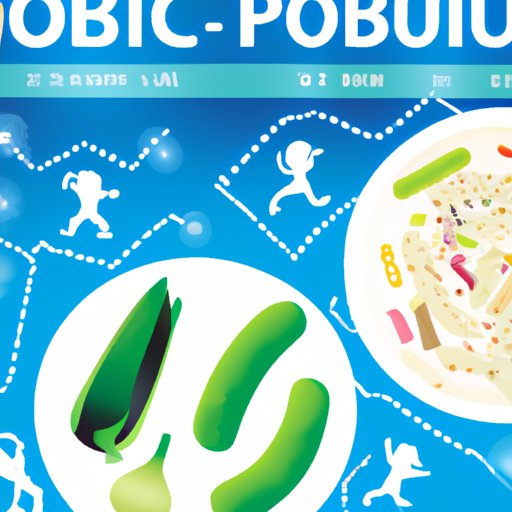Introduction
Gut health is a critical component of overall health – but what exactly is gut health? In general, it refers to the balance of bacteria in your digestive system and the functioning of your digestive system as a whole. If you have poor gut health, it can lead to a variety of symptoms including constipation, bloating, and nausea. Fortunately, there are a number of things you can do to improve your gut health and get back to feeling your best.
Include Probiotics and Prebiotics in Your Diet
Probiotics and prebiotics are two key components of gut health and should be included in your diet. Probiotics are beneficial bacteria that live in your digestive system, while prebiotics are food sources that help feed those beneficial bacteria. Together, they can help promote a healthy balance of bacteria in your gut.
What are Probiotics and Prebiotics?
Probiotics are live microorganisms that can provide a range of health benefits when taken in adequate amounts. They are found naturally in certain foods such as yogurt, sauerkraut, and kimchi, as well as in some supplements. Prebiotics, on the other hand, are indigestible plant fibers that feed the beneficial bacteria in your gut. They are found in foods such as onions, garlic, bananas, and oats.
Benefits of Including Probiotics and Prebiotics
Adding probiotics and prebiotics to your diet can help improve your gut health by increasing the number of beneficial bacteria in your digestive system. This can help reduce inflammation, improve digestion, and boost your immune system. Additionally, adding more prebiotics to your diet can help feed the beneficial bacteria and further support your gut health.
How to Incorporate Probiotics and Prebiotics into Diet
Including probiotics and prebiotics in your diet is simple. Start by adding more fermented foods such as yogurt, kefir, sauerkraut, and kimchi to your meals. You can also look for probiotic supplements at your local health food store or online. When it comes to prebiotics, incorporate more fruits, vegetables, and whole grains into your meals.
Reduce Stress Levels
Stress can have a significant impact on your gut health. High levels of stress can lead to an imbalance of bacteria in your gut, which can lead to digestive issues such as constipation and diarrhea. Therefore, it’s important to manage your stress levels to ensure optimal gut health.
Effects of Stress on Gut Health
When you’re stressed, your body produces hormones that can disrupt the balance of bacteria in your gut. This can lead to digestive issues such as diarrhea, constipation, and bloating. Additionally, stress can interfere with the absorption of nutrients from food, further contributing to digestive issues.
Strategies to Reduce Stress
There are a number of ways to reduce stress and improve your gut health. Start by making sure you get enough sleep – aim for 7-8 hours each night. Additionally, practice mindfulness activities such as deep breathing, yoga, and meditation. Finally, find ways to relax and have fun, such as taking a walk, reading a book, or listening to music.
Avoid Processed Foods
Processed foods are high in sugar, fat, and sodium, all of which can contribute to digestive issues. Therefore, it’s important to limit your intake of processed foods and opt for healthier alternatives instead.
Reasons to Avoid Processed Foods
Processed foods are often high in sugar, fat, and sodium, all of which can contribute to digestive issues. Additionally, many processed foods contain additives and preservatives that can further irritate your digestive system. Furthermore, processed foods are often low in fiber, which can lead to constipation.
Examples of Healthy Alternatives
Instead of processed foods, opt for whole, unprocessed foods such as fruits, vegetables, nuts, seeds, and whole grains. These foods are rich in fiber and other nutrients that can help support your gut health. Additionally, look for organic, hormone-free meats and dairy products whenever possible.
Increase Fiber Intake
Fiber is an important component of gut health. It helps keep your digestive system regular and helps you absorb nutrients from food. Therefore, it’s important to make sure you’re getting enough fiber in your diet.
Benefits of Increasing Fiber Intake
Increasing your fiber intake can help reduce constipation, improve digestion, and maintain a healthy balance of bacteria in your gut. Additionally, fiber can help you feel fuller for longer, which can help with weight management.
Ways to Increase Fiber Intake
The easiest way to increase your fiber intake is to incorporate more whole, unprocessed foods into your diet. Focus on fruits, vegetables, nuts, seeds, and whole grains. Additionally, look for foods that are high in soluble fiber, such as oatmeal, apples, and blueberries.
Exercise Regularly
Regular exercise is another important component of gut health. Exercise can help reduce inflammation, improve digestion, and reduce stress levels. Therefore, it’s important to make sure you’re getting enough physical activity each day.
Benefits of Regular Exercise
Regular exercise can help reduce inflammation, improve digestion, and reduce stress levels. Additionally, exercise can help stimulate the production of beneficial bacteria in your gut, which can further support your gut health.
Types of Exercise Recommended
For optimal gut health, aim to get 30 minutes of moderate exercise each day. This could include walking, jogging, cycling, swimming, or any other type of aerobic activity. Additionally, strength training and stretching can help improve your overall health and wellbeing.
Conclusion
Gut health is an important part of overall health. By following the tips outlined above, such as incorporating probiotics and prebiotics into your diet, reducing stress levels, avoiding processed foods, increasing fiber intake, and exercising regularly, you can improve your gut health and get back to feeling your best.
(Note: Is this article not meeting your expectations? Do you have knowledge or insights to share? Unlock new opportunities and expand your reach by joining our authors team. Click Registration to join us and share your expertise with our readers.)
